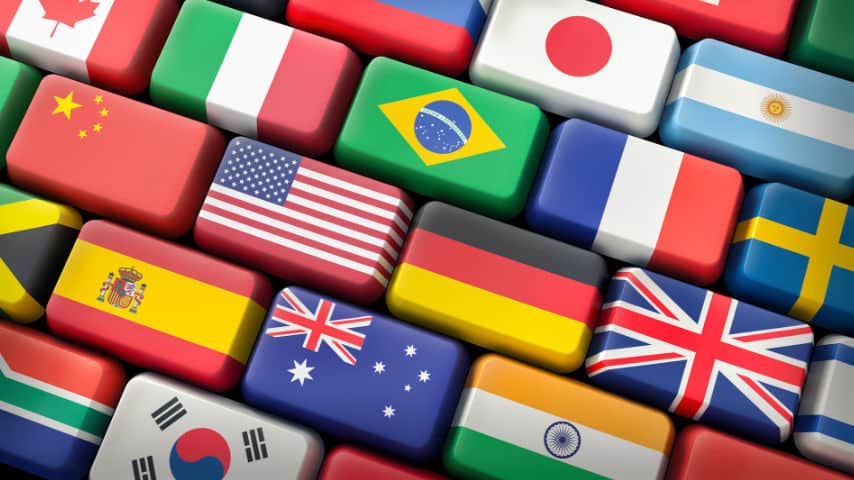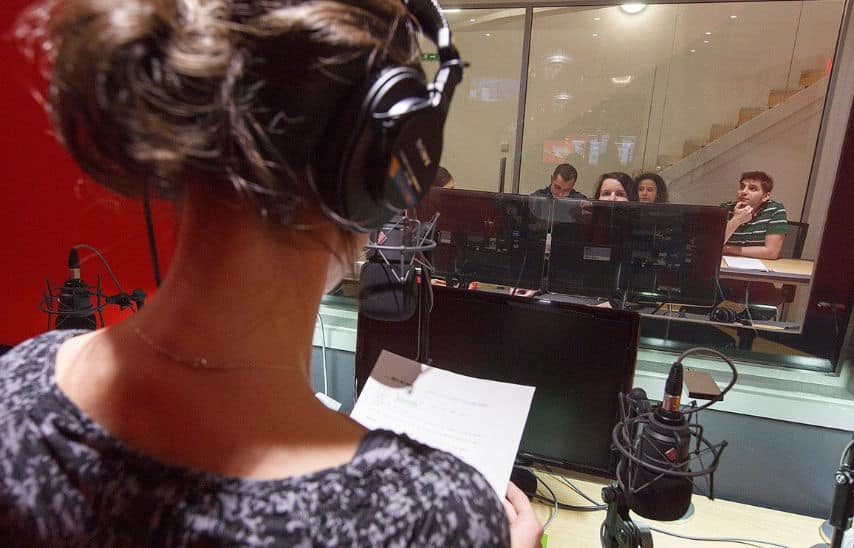In an increasingly interconnected world, the roles of interpretation and translation have become more important than ever. These disciplines are essential for more than just converting words from one language to another; they bridge cultural divides and foster understanding among people from diverse backgrounds. As businesses expand globally, communities become more multicultural, and international collaborations rise, the need for effective interpretation and translation services grows exponentially. These linguistic processes enable the sharing of ideas, information, and values across linguistic boundaries, playing a pivotal role in global communication, diplomacy, education, and numerous other sectors. Understanding and effectively utilising these services is key to thriving in a globalised society.
Interpretation and translation are two linguistic disciplines that are very closely related. These language services enable communication between cultures, which is vital in a global world, especially in the public sector. Although there are many similarities between interpretation and translation, they require completely different language knowledge, aptitude, training, and skills.
This blog post will provide you with a detailed understanding of what these services are, how they are different, and which service would be suitable for what type of situation.
Table of Contents
ToggleWhat is Translation?
The translation service is the process of converting written material from one language to another, ensuring the original meaning, tone, and intent are maintained. This intricate process involves more than just a literal word-for-word translation; it requires a deep understanding of the nuances, cultural contexts, and idioms of both the source and target languages. The scope of translation encompasses various fields and industries, each with its unique challenges and requirements.
The advent of technology has significantly transformed the landscape of translation. Tools such as Computer-Assisted Translation (CAT) software, translation memory systems, and online dictionaries have enhanced the efficiency and accuracy of translations. These technologies aid translators in managing large volumes of text, maintaining consistency, and ensuring faster turnaround times while preserving the quality of the translated material.
The main difference between language translation and interpretation is that translators can use a wide variety of computer-assisted tools to make the process easier and more accurate. Translators can refer to parallel texts and other written materials to ensure accuracy.
There are several types of translation services, each catering to specific needs and sectors:
- Legal Translation: This involves the translation of legal documents such as contracts, agreements, and court documents. It requires a thorough understanding of legal terminologies and concepts in both the source and target languages.
- Medical Translation: Medical translation is crucial for pharmaceuticals, healthcare providers, and medical device manufacturers. It includes patient records, clinical study reports, and product manuals. Accuracy is paramount in medical translation due to the sensitive nature of the content.
- Technical Translation: This type focuses on documents related to technical and scientific fields, such as engineering, IT, and electronics. It involves translating user manuals, technical specifications, and scientific papers, requiring translators to have a background or understanding of the relevant technical fields.
Translation services are used extensively for professional purposes such as e-learning translation, legal translation, and medical translation. Other instances when language translation services are helpful are audio-video translations, such as video games, corporate videos, advertisements, and training materials.
By encompassing these diverse areas, translation plays a vital role in facilitating global communication, enabling businesses and individuals to operate effectively in different linguistic and cultural landscapes.
What is Interpretation?
Interpretation is a verbal form of translation, executed by a professional interpreter, that takes place in real-time. This dynamic and immediate process differs significantly from written translation, as it involves the oral translation of spoken language from one language to another on the spot. Interpretation services are crucial in various scenarios that require live translation, such as live TV coverage, legal proceedings, medical appointments, meetings, and conferences, especially for some of the top languages spoken in the UK.
Professional interpreters are skilled in quickly transposing spoken words from the original language into the target language while preserving the original meaning, context, and nuances. Unlike translation, interpreters cannot rely on reference materials, dictionaries, or scripts during the process. They are required to rephrase colloquialisms, idioms, and culturally specific references, ensuring that the target audience fully comprehends the message (check out these mega translation mistakes made by large corporations!). This demands interpreters to have quick reflexes, an excellent memory, and substantial experience in the field.
The skills necessary for professional interpreters extend beyond linguistic proficiency. They must possess strong public speaking abilities, as well as a deep understanding of cultural nuances. Maintaining ethical standards such as confidentiality and impartiality is also a critical aspect of their role.
Interpretation services are used in projects that require live translation to some of the top languages spoken in the UK, such as live TV coverage, legal proceedings, medical appointments, meetings, and conferences.
Interpretation services can be categorized into several types, each suited to different environments and requirements:
- Simultaneous Interpretation: Often used in large meetings or conferences, where interpreters translate the speaker’s words in real-time, typically in sound-proof booths.
- Consecutive Interpretation: Common in smaller settings, the interpreter waits for the speaker to pause before translating their speech, requiring excellent memory skills for longer segments.
- Whispered Interpretation: A form of simultaneous interpretation used when only a few individuals require the service, where the interpreter whispers the translation to them.
- Sign Language Interpretation: Essential for the deaf and hard of hearing community, translating spoken language into sign language and vice versa.
Each type of interpretation plays a crucial role in bridging communication gaps, ensuring that regardless of the language spoken, the message is conveyed accurately and effectively in various settings.
Translation vs. Interpretation: Understanding the Differences
While often mentioned in the same context, translation and interpretation are distinct services, each with unique applications and requirements. Understanding these differences is crucial for selecting the appropriate service for specific communication needs.
In-depth Comparison
Translation is primarily concerned with the written word. This process involves converting text from a source language to a target language while maintaining the original content’s meaning, tone, and style. Translators have the advantage of time, allowing them to research and use resources like dictionaries and translation software. This ensures accuracy and cultural relevance, making translation an essential process for producing various written materials such as documents, books, websites, and media subtitles.
In contrast, interpretation focuses on the spoken word. It requires interpreters to listen to speech or conversation in one language and orally convert it to another language almost instantaneously. This service becomes vital in scenarios where real-time communication is necessary, such as during conferences, diplomatic meetings, medical appointments, and court hearings. Interpreters must possess a deep understanding of both languages involved and the ability to quickly and accurately convey the message, tone, and nuances of the speaker.
Situational Examples
In the legal arena, the translation of documents like contracts, witness statements, or legal rulings is a common requirement. Here, the emphasis is on accuracy and adherence to legal terminology in the target language. In the business world, translation plays a key role in localising websites, marketing materials, and product manuals, ensuring that content is culturally and linguistically tailored to the audience.
Conversely, in the realm of interpretation, situations like international conferences often employ simultaneous interpreters. These professionals provide real-time translation of speeches, enabling attendees from various linguistic backgrounds to comprehend the proceedings in their language. In healthcare settings, consecutive interpreters frequently facilitate patient-doctor interactions, especially when the patient and healthcare provider do not speak the same language, thus ensuring accurate and effective communication.
While both translation and interpretation strive to bridge language gaps, they serve distinct purposes and require different skill sets. Translation is crucial for written communications, demanding meticulous attention to detail and the ability to work with language nuances over time. Interpretation, on the other hand, is indispensable for live or immediate verbal communications, requiring quick thinking, excellent listening abilities, and the capacity to accurately convey spoken words and their meanings on the fly.
The Importance of Cultural Nuance in Interpretation and Translation
In the nuanced fields of interpretation and translation, the role of cultural understanding is paramount. These disciplines involve much more than the straightforward conversion of language; they require bridging cultural gaps and ensuring that the message resonates appropriately with the target audience. Cultural nuances, encompassing idiomatic expressions, social norms, and contextual references, are integral to effective communication.
Cultural Understanding in Translation and Interpretation
Understanding and sensitivity to the cultural contexts and nuances of both the source and target languages are at the heart of cultural understanding in translation and interpretation. This aspect is critical because phrases and expressions often carry meanings or connotations deeply rooted in a specific culture. A translator or interpreter must skilfully navigate these nuances to prevent misinterpretations or offensive renderings.
Tackling Cultural Challenges
In translation, dealing with idiomatic expressions or colloquialisms is a key challenge, as they may not have direct equivalents in the target language. For instance, an English phrase like “raining cats and dogs” might be nonsensical if translated literally into another language. The skill lies in finding an expression in the target language that conveys a similar sentiment or meaning.
Similarly, cultural references such as allusions to historical events, celebrities, or local customs can pose challenges. Translators might need to adapt these references to be more universally understood or provide brief explanations within the translated text.
Interpretation brings its own set of challenges, especially regarding non-verbal communication cues, which can vary significantly across cultures. An interpreter must be acutely aware of these differences; gestures or facial expressions acceptable in one culture might be rude or offensive in another. This sensitivity ensures respectful and accurate communication.
Additionally, interpreters face the challenge of real-time cultural adaptation during simultaneous interpretation. Without the luxury of time to research, they must rapidly adapt or explain cultural references on the spot, necessitating an immediate and profound understanding of both cultures involved.
The ability to master cultural nuances in interpretation and translation is not just a linguistic skill but a form of cultural intelligence. This facet of their work highlights the complexity and depth of these professions, underscoring their importance in our globalised and culturally diverse world. Achieving such proficiency often requires extensive experience, ongoing learning, and, in some cases, specialist knowledge in certain cultural areas.
When Do You Need a Translator?
The need for a translator arises in various scenarios, particularly where the accuracy and precision of language are crucial. In the public sector, government bodies must ensure that all citizens, regardless of their language, have access to vital information. Translation services are instrumental in overcoming language barriers, especially in emergency situations where timely and accurate communication is essential.
With the linguistic diversity in the UK, where over 300 languages are spoken, the role of translation in the public sector has become increasingly important. Translation services are utilised across a broad spectrum of public sector offices, from community safety announcements to diplomatic communications. These services ensure that crucial information is accessible and understandable to everyone, fostering an inclusive community environment.
In the healthcare industry, the impact of translation services is profound. They play a vital role in ensuring that patients receive life-saving information in a language they can understand. This extends to public health announcements and guidelines, making health information accessible to a diverse patient population.
Translation also has significant implications in the education and business sectors. In education, it enables students from different linguistic backgrounds to access educational materials, promoting equal learning opportunities. In the business world, translation is essential for companies looking to expand their reach to global markets, localising websites, marketing materials, and product documentation.
Furthermore, professional translators are key in navigating the intricacies of language, such as identifying and correctly translating ‘false friends‘ – words that look similar in different languages but have different meanings. Addressing Spanish False Friends or common French Faux Amis requires a translator’s expertise to ensure clarity and prevent misunderstandings.
Overall, the need for a translator spans various sectors and situations, highlighting the importance of accurate and culturally sensitive translations in fostering global understanding and communication.
When Do You Need an Interpreter?
The requirement for an interpreter arises in various situations, particularly where live translation is necessary. Interpretation services are vital for settings where real-time, accurate language conversion is crucial. They are commonly used in conferences, meetings, and for live TV broadcasts, where the immediacy of understanding is paramount.
In the realm of public sector, the role of interpreters is substantial across numerous domains, including social welfare, education, health, law enforcement, justice, and immigration. Professional interpreters facilitate communication between public sector professionals and individuals who speak different languages, providing immediate and clear translation on the spot. This ability to communicate in the native language of the audience is essential for ensuring that the services provided are accessible and effective.
Interpretation plays a crucial role in multicultural interactions and live events. For instance, during international summits or diplomatic meetings, simultaneous interpreters ensure that delegates and attendees can follow discussions in their own language, regardless of the language of the speaker. In legal settings, like courtrooms, interpreters ensure that all parties fully understand the proceedings, maintaining the fairness and integrity of the legal process.
In healthcare, interpreters are indispensable in situations where patients and medical staff do not share a common language. By providing interpretation, they ensure that patients fully understand their diagnoses, treatment plans, and healthcare information, which is critical for effective and safe medical care.
Furthermore, in educational settings, interpreters help in bridging the language gap between educators and students or parents who are non-native speakers, ensuring that the educational content and discussions are fully accessible.
The need for high-quality interpretation services highlights the importance of accurate and immediate language translation in facilitating effective communication and understanding in diverse and dynamic environments. Professional interpreters play a key role in ensuring that language barriers do not impede access to services, information, and participation in important events.
Professional Challenges in Interpretation and Translation
The fields of interpretation and translation present unique challenges, requiring a distinct set of skills and expertise. Professionals in these areas navigate complex linguistic and cultural landscapes, often under significant pressure to deliver accurate and contextually appropriate translations.
Challenges in Translation
In translation, one major challenge is maintaining the nuance and tone of the original text. Translators must accurately convey not just the literal meaning but also the subtleties of the language, which can include irony, humour, and emotional undertones. For example, literary translation, such as novels or poetry, demands a deep understanding of both the source and target cultures to capture the author’s original intent and style.
Another significant challenge in translation is dealing with technical or specialised content. Translators often encounter texts filled with industry-specific jargon, such as legal documents, medical reports, or scientific research papers. They must have or develop expertise in these fields to ensure the translated content is accurate and comprehensible to the target audience.
Challenges in Interpretation
For interpreters, one of the primary challenges is the need for immediate response. In simultaneous interpretation, for instance, interpreters must listen to the speaker, process the information, and translate it into the target language almost instantly. This requires not only linguistic skills but also a high level of concentration and mental agility.
Another challenge in interpretation is managing cultural differences and non-verbal cues. Interpreters must be aware of and sensitive to the cultural nuances that can influence the meaning of the spoken word. For example, in diplomatic or international business settings, a misunderstanding of cultural etiquette or idioms can lead to miscommunication or even diplomatic incidents.
Case Studies and Examples
- A notable case in translation involved the legal dispute over a contract where a single mistranslated term led to a multimillion-dollar lawsuit. The translator had not fully grasped the legal nuances of the term in the source language, leading to a significant misinterpretation in the contract’s translated version.
- In interpretation, a challenging scenario occurred during a high-stakes political negotiation, where the interpreter had to navigate not only the linguistic differences but also the political implications of each word. The interpreter’s ability to accurately and quickly convey the speakers’ intentions was crucial in facilitating a successful diplomatic dialogue.
These examples illustrate that professionals in interpretation and translation not only need to be adept in languages but also must possess a deep understanding of the cultural and contextual aspects of their work. Their role is vital in ensuring that communication across languages is not just linguistically accurate but also culturally and contextually relevant.
Latest Trends and Technologies in Interpretation and Translation
The fields of interpretation and translation are rapidly evolving, with new technologies and trends significantly impacting how linguistic services are delivered. These advancements are shaping the future of these fields, bringing both opportunities and challenges.
Advancements in Technology
One of the major trends in translation is the increasing use of Machine Translation (MT) and Artificial Intelligence (AI). Tools like Google Translate and DeepL have become more sophisticated, offering quicker translations of text. However, while these tools are beneficial for basic translations, they still struggle with complex texts that require understanding of context and cultural nuances.
Computer-Assisted Translation (CAT) tools are another significant advancement. These tools, which include translation memory systems and glossary databases, aid human translators by ensuring consistency across large volumes of text and reducing the time required for translation projects.
In interpretation, remote interpreting technology has seen a surge, particularly due to the COVID-19 pandemic. Platforms like Zoom and Microsoft Teams have integrated interpretation features, enabling interpreters to work from anywhere in the world. This has opened up new opportunities for remote and hybrid events.
Impact on the Future
The integration of AI and machine learning in translation and interpretation is set to continue. These technologies are expected to become more sophisticated, potentially offering higher accuracy and efficiency. However, the human element remains irreplaceable, particularly for tasks requiring understanding of subtleties, cultural contexts, and creative language use.
Another trend shaping the future is the growing demand for localisation services. As businesses continue to globalise, there is an increasing need to adapt products and content to local languages and cultures. This goes beyond mere translation, encompassing cultural adaptation and customisation.
The use of augmented reality (AR) and virtual reality (VR) in interpretation and translation is also on the rise. These technologies could revolutionise how language services are provided, offering immersive and interactive experiences, especially in education and training.
What’s Better: Interpreting or Translation?
Determining whether interpreting or translation is better depends largely on the specific context and requirements of the communication situation. Now that we’ve understood the differences between the two, we can explore scenarios where one may be more suitable than the other, as well as consider factors like cost-effectiveness and accuracy.
Analysis of Scenarios
Translation is particularly suited for asynchronous communication, such as written text or audiovisual content. It is ideal for situations where there is a need for detailed analysis, extensive research, and accuracy. For instance, translating legal documents, scientific papers, or literary works benefits from the meticulous and unhurried nature of translation, allowing for depth and precision.
Interpreting, on the other hand, is indispensable for live scenarios where immediate, oral translation is required. This includes conferences, legal proceedings, medical appointments, and diplomatic meetings. Here, the ability of interpreters to translate on the spot is critical, despite the potential for minor inaccuracies due to the real-time nature of the work.
Cost-Effectiveness and Accuracy
When it comes to cost-effectiveness and accuracy, translation generally has an advantage. Professional Translators have access to more resources and time to research and analyse text, which often results in greater accuracy. Additionally, translation can be more cost-effective in the long run as materials only need to be translated once and can be used repeatedly.
Interpreters, while they translate between languages instantly, may encounter room for inaccuracies due to the immediate nature of their work. However, professional interpreters are skilled at maintaining a high level of accuracy even in fast-paced environments. They also have a deep understanding of cultural nuances, which is crucial for effective communication in live scenarios.
In summary, whether translation or interpreting is better depends on the specific needs of the situation. Translation is generally more suited for tasks that require high accuracy and can be done over a longer period, while interpreting is ideal for live events where instant communication is necessary. Both services are essential in their own right, serving distinct but equally important purposes in global communication.
Choosing the Right Service for Your Needs
Selecting the appropriate service between interpretation and translation is crucial for effective communication, especially in a global context. Understanding the factors that influence this choice can help in making an informed decision that best suits your specific needs.
Guidelines for Selecting Services
- Assess the Nature of the Content: Determine whether the content is spoken or written. For written materials like documents, reports, or websites, translation services are appropriate. If the requirement is for live or spoken communication, such as conferences, meetings, or interviews, then interpretation services are more suitable.
- Consider the Timing and Urgency: If the need is for real-time communication, especially in situations like negotiations, medical appointments, or live broadcasts, interpreting is the way to go. For projects where there is more flexibility in terms of deadlines, and where accuracy and depth of language are paramount, translation is more fitting.
- Understand Your Audience: The nature of your audience plays a significant role. For a diverse audience in a live setting, interpreters can ensure that language barriers do not hinder the flow of information. In contrast, for a global audience accessing written content, translators can localize the material to resonate culturally and linguistically with different segments of your audience.
Factors to Consider
- Time: Consider whether the project requires immediate execution or can afford a longer timeframe. Interpretation is instant, whereas translation can take time, depending on the complexity and volume of the content.
- Content Type: The type of content—whether it’s legal, medical, technical, or creative—can dictate the choice. Specialized content might require the detailed attention that translation offers, while general conversational content might be more suited for interpretation.
- Audience: The demographics, size, and preferences of your audience should be considered. For instance, a multilingual audience at a conference would benefit from interpretation services, whereas a global audience reading online content would require translated material.
The decision between interpretation and translation depends on various factors like the nature of the content, timing, urgency, and audience. Assessing these aspects carefully will guide you in choosing the service that most effectively meets your communication requirements.
Professional Interpretation and Translation Services in the UK
In the UK, known for its cultural diversity and linguistic plurality, the importance of professional interpretation and translation services is paramount. These services are vital for facilitating communication across the nation’s multitude of languages, especially important in both public and private sectors.
Significance of Professional Services
With communities in the UK speaking over 300 different languages, professional services in interpretation and translation play a crucial role. They ensure that language barriers do not impede access to essential services such as healthcare, education, and legal assistance, and are also key in business for effective international communication.
The Need for Skilled Professionals
The UK’s linguistic complexity necessitates skilled professionals who are not only fluent in multiple languages but also understand the cultural nuances. In the public sector, their role is vital in providing equal access to services, maintaining justice in legal settings, and ensuring effective communication in healthcare. In the business realm, these services are crucial for global market expansion, helping to localize products and marketing materials for international audiences.
The demand for professional interpretation and translation services in the UK underscores the country’s commitment to multiculturalism and inclusivity. These services are essential in building cultural bridges and facilitating effective communication in a globally connected world.
FAQs
What are the primary differences in Translation vs. Interpretation?
The main difference in Translation vs. Interpretation lies in the medium: translation is written, and interpretation is spoken. Additionally, translation allows for more time and resource use, while interpretation requires instant linguistic conversion and adaptation.
When should I use interpretation services?
Interpretation services are ideal for situations requiring immediate verbal translation, like conferences, court proceedings, medical appointments, and live broadcasts.
What are the challenges in Interpretation and Translation?
Interpretation and Translation each present unique challenges. Translation demands meticulous attention to detail and cultural nuances, while interpretation requires quick thinking, excellent memory, and adaptability to diverse speaking styles and idioms.
How do I choose between Translation vs. Interpretation services?
The choice in Translation vs. Interpretation depends on your needs. If your project involves written content (documents, websites, etc.), opt for translation. For live or immediate verbal communication, interpretation is the suitable service.
Are there specialised fields in Interpretation and Translation?
Yes, in Interpretation and Translation, there are specialised fields like legal, medical, technical, and literary translation and interpretation, each requiring specific knowledge and skills.
Can technology replace human experts in Interpretation and Translation?
While technology aids in Interpretation and Translation, it cannot fully replace human expertise, especially in areas requiring understanding of context, culture, and nuanced language.
What qualifications should a professional in “Interpretation and Translation” have?
Professionals in “Interpretation and Translation” should have language proficiency, cultural understanding, relevant qualifications, and experience in their specialised fields.
Final Thoughts
The fields of interpretation and translation are indispensable in our increasingly globalised world. Each serves a unique purpose in bridging communication gaps across different languages and cultures. Translation is key for written materials, requiring meticulous attention to detail and cultural nuances. Interpretation, on the other hand, is essential for real-time verbal communication, demanding quick thinking and adaptability.
In the UK, with its rich tapestry of languages and cultures, professional translation and interpretation services play a critical role in various sectors. From public services ensuring accessibility and inclusivity to businesses aiming to expand their global reach, these services are fundamental to effective communication.
Professional Translation Services in the UK
GoLocalise can be your ally to reach foreign language-speaking audiences in the UK and Europe. High-quality audiovisual translation and localisation projects require professionals with specific skill sets, technical know-how, and years of experience. Contact our team at GoLocalise today to discuss your audio-visual translation needs and for a quote.
Test your knowledge with these fun translation questions.






















